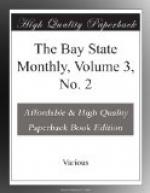Elizabeth lost the rest of the sentence. She was already on her way home by the other road, treading softly while on the beach, lest the pebbles should betray her footsteps. When she was well out of hearing she stopped a moment to take breath. She stood looking out upon the expanse of ocean before her as if her sight could reach to the unknown world beyond it.
“Last night,” she said, “I thought the worst had come to me. I was wrong.”
[TO BE CONTINUED.]
[Footnote 2: Copyright, 1884, by Frances C. Sparhawk.]
* * * * *
MEMORY’S PICTURES.
By Charles Carleton Coffin, 1846.
It is a pleasure to throw back the door,
And view the relics
of departed hours;
To brush the cobwebs from the ancient
lore,
And turn again the book
of withered flowers.
Within the dusty chambers of the past,
Old pictures hang upon
the crumbling walls;
Dim shadowy forms are in the twilight
cast,
And many a dance is
whirling through the halls.
There are bright fires blazing on the
hearth,
The merry shout falls
on the ear again;
And little footsteps patter down the path,
Just like the coming
of the summer rain.
I hear the music of the rippling rill,
The dews of morn are
sprinkled on my cheek;
While down the valley and upon the hill
The laughing echoes
play their hide-and-seek.
I roam the meadow where the violets grow,
I watch the shadows
o’er the mountain creep;
I bathe my feet where sparkling fountains
flow,
Or bow my head on moss-grown
rocks to sleep.
I hear the bell ring out the passing hour,
I hear its music o ’er
the valleys flung;
O, what a preacher is that time-worn tower,
Reading great sermons
with its iron tongue!
The old church clock, forever swinging
slow,
With moving hands at
morning and at even,
Points to the sleepers in the yard below,
Then lifts them upward
to the distant heaven.
How will such memories o’ er the
spirit stray,
Of hopes and joys, of
sorrows and of tears;
They are the tomb-stones time will ne’er
decay,
Although the moss will
gather with the years.
* * * * *
EARLY ENGLISH POETRY.
By Professor Edwin H. Sanborn, LL.D.
Our Saxon ancestors when they conquered England, were rude, barbarous, and cruel. The gods of their worship were bloodthirsty and revengeful. Odin, their chief divinity, in his celestial hall drank ale from the skulls of his enemies. In the year 596, the Monk Augustine, or Austin, was sent by Pope Gregory to attempt their conversion to Christianity. He and his associates were so successful that on one occasion ten thousand converts were baptized in one day. Of course their conversion was external and nominal. They still clung to their old superstitions and customs. But with the new religion came new ideas.




